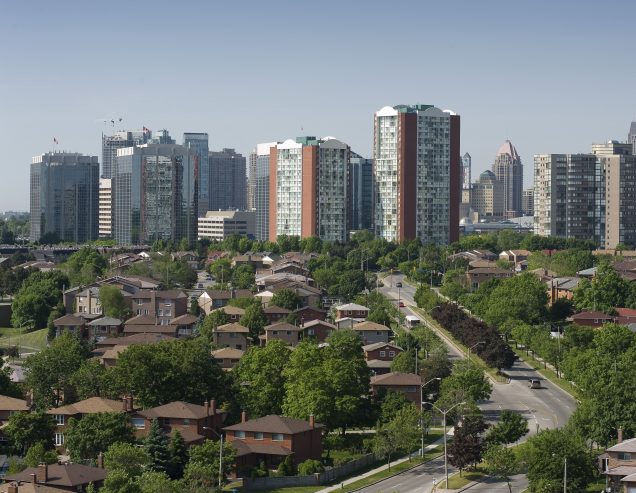Ontario housing report calls for bold goal to up supply
Ontario housing report calls for bold goal to up supply

Mississauga Mayor Bonnie Crombie
To build 1.5 million homes in 10 years
March 9, 2022
By Veronica Silva Cusi
The Philippine Reporter
LJI Reporter
A report by a task force established by Ontario is calling for more homes to be built in the next 10 years to address the housing crisis in the province.
The report from the Housing Affordability Task Force calls for a “bold goal” of building 1.5 million homes over the next 10 years to address the supply shortage. The goal is one among 55 recommendations along five main points: density, municipal rules, approvals process, appeals system, and financial support.

Affordable housing in Mississauga
The report cited a 2021 study by Scotiabank that showed that Canada has the fewest housing units per population of any G7 country, and the per capita supply has dropped in the past five years. Two-thirds of this housing shortage is in Ontario.
While the per capita supply has dropped, home prices in Ontario have almost tripled in the last 10 years, making home ownership unaffordable, “even those with well-paying jobs,” the report noted. The average housing price in the province has reached $923,000 in end-2021 compared to $329,000 10 years ago, a jump of 180% while average incomes increased only by roughly 38%.
The report noted that the housing crisis impacts all Ontarians and the province’s potentials.
“With projected population growth, that huge gap is widening, and bridging it will take immediate, bold and purposeful effort. And to support population growth in the next decade, we will need one million more homes,” the report reads.
To increase density, the report recommends efficient use of land, including underused or redundant commercial and industrial buildings that are good for redevelopment into housing.

321 Dovercourt is Toronto’s second modular, supportive housing building that addresses affordable housing in Canada’s largest city.
Photo from
City Media Room.
“New housing on undeveloped land should also be higher density than traditional suburbs, especially close to highways,” the recommendation goes.
The report also recommends streamlining municipal design rules to fast track the development of more housing units. Studies and requirements on housing “go well beyond the requirements of the provincial Planning Act,” resulting in “delays and extra costs that make housing either impossible to build or very expensive for the eventual home buyer or renter.”
The report also took a jab at red tape and the politicization of housing policies that are slowing down the approvals process in building housing.
“Because local councillors depend on the votes of residents who want to keep the status quo, the planning process has become politicized,” the report noted. Instead of having “far more public consultation than is required” — where not many families can participate — the report recommends that some technical work be delegated to municipal staff.
“Dysfunction throughout the system, risk aversion and needless bureaucracy have resulted in a situation where Ontario lags the rest of Canada and the developed world in approval times. Ontarians have waited long enough,” the report reads.
With the red tape and politicization, the report noted that some proponents go to the tribunal system to get approvals. This option causes delays in housing approvals and a backlog for the quasi-judicial Ontario Land Tribunal.
The Task Force recommends six steps to prevent the “abuse of the appeal process,” including requiring appellants to show proof that the appeal has merit, a $10,000 filing fee for third-party appeals, encouraging oral decisions and paper work to follow later, allowing the Tribunal to award punitive damages if municipalities lack approval, providing more funding to the Tribunal to add more staff, and for the Tribunal to prioritize projects that are near the “finish line” to support housing growth.
And for those who exemplify in addressing the housing crisis, the report recommends financial rewards by creating an Ontario Housing Delivery Fund, hopefully with matching federal support, to incentivize increasing housing supply.
Conversely, municipalities that fail to meet provincial housing growth and approval timeline targets should see their funding reduced, the report recommends.
In calling for federal counterpart funding, the Task Force noted the need to align policies of all levels of governments. Immigration is a federal policy, provinces set the framework for planning, approvals and growth, while municipalities are expected to translate these policies and guidelines to deliver housing. However, “collectively, governments have not been sufficiently aligned in their efforts to provide the frameworks and incentives that meet the broad spectrum of housing needs in Ontario,” the report reads.
Responding to the report, Steve Clark, Minister of Municipal Affairs and Housing, said: “Everyone has a role to play in addressing the housing supply crisis. As our government consults with municipalities, the public, and industry leaders and experts, we are balancing these perspectives to develop practical, forward-thinking policies that unlock and fast-track all types of housing for all types of Ontarians.”
For its part, the municipality of Mississauga, Ont. released early this month a detailed response to the housing report.
“Overall, Mississauga has demonstrated a strong commitment to affordable housing. However, staff are concerned that many of the Task Force’s recommendations may diminish the planning process and quality of life in the city, but fail to deliver affordable housing,” read a City Corporate Report dated March 2, 2022.
“While we support some of the Task Force recommendations, several shift the responsibility for this problem solely on municipalities. I’m calling on the province to engage in meaningful conversation with cities before moving forward with any of these recommendations. Solving this crisis requires commitment from all levels of government, landowners, developers, builders, investors and landlords,” said Mississauga Mayor Bonnie Crombie in a statement.
Among its point-by-point reaction to the Task Force report is on the planning process. “Recommendations aimed at speeding up the planning process such as reducing public consultation and decision-making time, may in fact have the opposite effect,” the city statement reads.
On the redevelopment of any or all underutilized commercial and industrial properties, the City of Mississauga said this “may be detrimental to the development of complete communities and vibrant, local businesses. Consideration should be given to striking a balance in order to preserve affordable commercial properties.”
Another recommendation in the report that the city finds detrimental is reducing development charges and municipal fees. If these fees that help the city fund infrastructure, parkland and services, the city may have to raise taxes or reduce services.
Responding to the report, Toronto, Ont. Mayor John Tory told reporters he has had discussions with Ontario Premier Doug Ford and Minister Clark. Tory was quoted in CBC as saying: “It is local officials … who know best, not the provincial government.”
The task force was created by Housing Affairs Minister Clark in December 2021 “to explore measures to address housing affordability.” Jake Lawrence, CEO and Group Head, Global Banking and Markets at Scotiabank, was appointed chair with members representing housing stakeholders and the academia.
Federal Housing Advocate
Shortly before the Ontario report was released, the federal government announced the appointment of the country’s first federal housing advocate. Marie-Josée Houle will serve a three-year term and is expected to promote and protect housing rights in Canada.
The appointment of the federal housing advocate is contained in the National Housing Strategy Act passed by Parliament in 2019.
Comments (0)